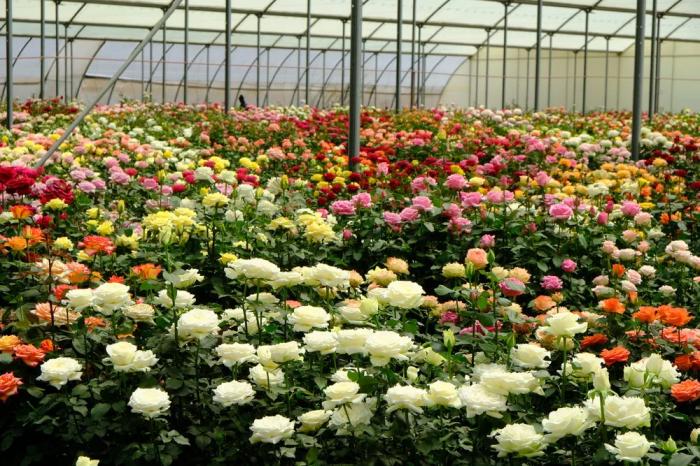In the heart of Kenya’s flower industry, a single mother named Anne (not her real name) endures long hours and low pay as she works to send fresh roses to Europe. Based in the lakeside town of Naivasha, Anne’s daily life is a reflection of the broader struggles faced by thousands of workers in this vital sector.
A Grueling Work Environment
On a moonless night in Naivasha, Anne rests in a modest two-room house after a demanding shift of picking and sorting roses. She is one of many women laboring in Kenya’s flower farms, which are crucial to the nation’s economy. Located approximately 90 kilometers northwest of Nairobi, these farms operate in extensive greenhouses filled with vibrant flowers.
Kenya’s flower industry employs over 150,000 people and generates approximately $1 billion annually in foreign exchange. However, despite her dedication to the job for over 15 years, Anne’s monthly salary has stagnated at just over $100, failing to keep pace with the rising cost of living.
“I often have to skip meals,” Anne shares, illustrating the tough choices many workers face. With prices for basic necessities like maize, wheat, and rice soaring, the financial strain has intensified.
Daily Routines and Challenges
Every day, Anne joins hundreds of workers to board buses that transport them to the flower farms. Their day begins at 7:30 AM, six days a week, with Sundays reserved for church. Typically, Anne works eight hours a day, but the pressure to meet production targets often compels her to extend her hours without additional pay.
In the warehouse, where flowers are cleaned, bunched, and sorted, conditions can be harsh. “We had to sort 3,700 stems a day,” she states, a daunting target that she and her colleagues are pressured to meet. Failure to do so could lead to reprimands from management, including the requirement to write a justification for not meeting goals.
“If you don’t meet the target, you might get thrown out,” she explains, highlighting the intense pressure workers endure.
Health Risks and Inadequate Support
In early 2023, Anne faced a serious health scare when she developed a blood disease that required medical attention. Despite her symptoms, including weakness and shortness of breath, she was urged to return to work after only one day of rest.
“It felt bad because I was still sick,” she recalls. The experience left her feeling unsupported in a workplace that prioritizes productivity over employee well-being.
Anne is also concerned about her exposure to hazardous chemicals used in flower cultivation. Workers are often required to spray pesticides without adequate protective gear, a situation that raises significant health risks.
Shared Concerns Among Workers
Margaret (not her real name), another flower picker, echoes Anne’s concerns. She reports that employees regularly handle dangerous chemicals with little to no protection. Meeting in secrecy at a colleague’s house, Margaret expresses her fear of retaliation from the industry.
“Nobody cares,” she asserts, reflecting the widespread sense of neglect among workers.
A report from Route To Food Initiative, an NGO based in Nairobi, reveals that hazardous pesticides, some of which are known carcinogens, are commonly used in Kenyan agriculture. Workers like Margaret have raised concerns with management but often face dismissive attitudes.
“They shout at everyone,” she says, detailing the hostile response to worker complaints.
Issues of Harassment and Safety
In addition to health risks, female workers in the flower industry frequently encounter issues of sexual harassment. Margaret notes that complaints of harassment are prevalent, contributing to a toxic work environment.
Despite the gravity of these allegations, there has been little response from the Kenya Flower Council or the Kenya Plant Health Inspectorate Service (KEPHIS), the government body responsible for overseeing the sector. Both organizations have yet to address claims of harassment, unpaid overtime, and poor working conditions reported by workers.
Economic Contributions vs. Worker Welfare
The Kenyan flower industry plays a vital role in the economy, providing fresh flowers to international markets, particularly in Europe. Yet, this economic success stands in stark contrast to the lived experiences of the workers who contribute to it.
Anne’s story highlights the challenges of low wages, high living costs, and poor working conditions that characterize the lives of many in this industry. The need for systemic change is urgent, as workers continue to advocate for fair treatment and safer working environments.
Conclusion
As Anne and her colleagues strive to make ends meet in a challenging industry, their stories shed light on the broader issues facing agricultural workers in Kenya. While the country benefits economically from flower exports, the well-being of those who toil in the fields remains a pressing concern.
For a sustainable future, it is essential for both the government and industry stakeholders to address these challenges. Ensuring fair wages, safe working conditions, and a supportive environment for workers will not only enhance their quality of life but also sustain the growth of Kenya’s vital flower industry.
Related topics:


